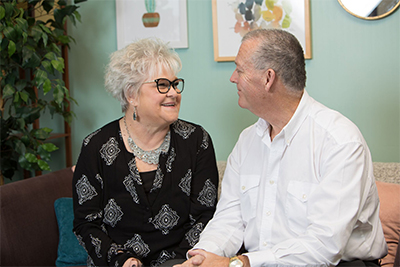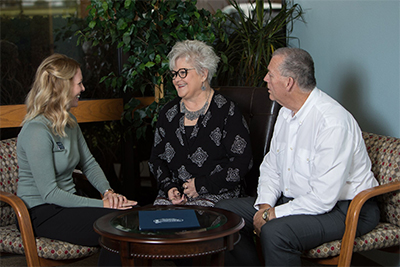A cancer diagnosis
rarely affects just one person. Friends, family members
and other loved ones of the person diagnosed are also
touched. Of these people, at least one will more than
likely take on the role of caregiver. That is what
happened to Mick Cooper.
Mick’s wife Linda was diagnosed with stage IV colon
cancer four years ago. “That’s kind of when a whole new
experience in life began,” Mick said. “Nothing can
prepare you for what you’re about to go through.”

For many, caregiving is a full-time job, and Mick had to
take on many new roles after Linda was diagnosed. He
became the cook, dish washer, house cleaner, “cab
driver,” grocery shopper and more. He’s also the voice
for Linda at her frequent medical appointments. He has
never missed any of her treatment appointments.
After one of Linda’s surgeries that temporarily left an
opening in her side, Mick for a month had to change her
bandages, pack her stomach and drain excess fluid. “But
he found the strength to do it,” Linda said. “He found
it and he did it.”
“Every day is a different day,” Mick said. “The ups, the
downs. You live for the dreaded scans, the week of chemo
treatment and the time in between. You just don’t know
what to expect.”
Linda’s oncologist recently told her that nothing they
have tried has made a significant difference in her
battle with cancer. Because of this and the intense side
effects she had been experiencing, Linda decided to stop
receiving treatment. “At that point, I told him because
of what it does to me, I had no quality of life,” she
said. “I don’t want any more treatments. I just want
quality of life now.”
As the caregiver, Mick had to learn to respect Linda’s
decisions when it came to her cancer care, even if he
didn’t necessarily want to. “When their decision is
made, you have to support them because they don’t need
that fight on top of the fight they already have,” Mick
said.
“Respect the patient’s decisions,” Linda said. “I think
the hardest thing is when as the spouse, you want them
to try everything out there because you don’t want to
lose them,” Linda said.
For a long time, Mick tried to handle his emotions on
his own. “As a caregiver, your emotions alone are going
to run from the highest to the lowest,” he said. “I felt
I could do it myself. You can’t, so open up. Have your
support system. Find that person.”
Mick found Miki Biggers, LCSW, OSW-C, Hope Cancer
Resources Director of Social Work Services. They started
meeting to give Mick the opportunity to open up. “In
these later times, Miki has stepped up to be more a part
of the help and the counseling,” Mick said. “She never
missed a hospital visit. She was there, and that’s what
our experience here has been. She was there.”

Hope Cancer Resources offers many different services
that benefit caregivers. If you are a cancer caregiver
and need support, please give us a call at 479-361-5847.